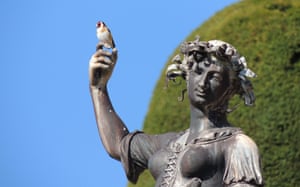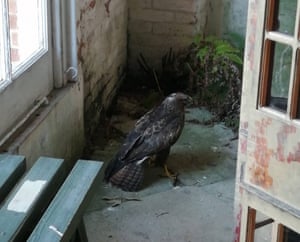First came the goats. During the first days of lockdown the bearded, ghostly white creatures wandered down from their north Wales clifftop home into the town of Llandudno and made headlines around the globe.
Now the National Trust is reporting that emboldened wildlife, from raptors and warblers to badgers, otters and even orcas, appear to be enjoying the disappearance of humans from its gardens, castles and waterways across the UK.

The charity is asking people to be aware that when they eventually return to the countryside they should take care not to disturb wildlife they would not usually expect to encounter.
Reports from rangers and gardeners include peregrine falcons nesting in the ancient ruins of Corfe Castle in Dorset, English partridges rootling around an empty car park near Cambridge, and a cuckoo calling at Osterley Park in west London, having not been heard there for 20 years
David Brown, the National Trust’s ecologist at Corfe Castle, said: “This is the first time peregrines have nested here since the 1980s. With the site the quietest it has ever been, the great curtain walls are an ideal spot for these birds, which look for isolated and inaccessible places to build a nest. Amongst all the uncertainty, it has been heartening to see nature colonising the landscape in our absence.”
At Plas yn Rhiw, a manor house on the Llyn Peninsula in north Wales, stoats, weasels and hares have come in from the woodland to explore the gardens, which are usually filled with visitors.
In Norfolk, a buzzard managed to get into the orangery at Felbrigg Hall and happily tucked into its lunch there. At the Ashridge estate in Hertfordshire, the rare sound of a grasshopper warbler was recorded in a typically busy dog-walking area.

Little owls have also been making their presence felt at Ham House in south-west London, venturing into the garden from the adjacent river meadows.
Some creatures appear to be missing human visitors, however.
Jackdaws, which enjoy feeding on scraps of food dropped by people, for example, have not returned to Ham House since the lockdown. And with no audience to show off to, the peacocks at Powis Castle, in mid-Wales, have taken to following gardeners on their daily rounds.
But the overall picture is positive. A family of badger cubs has been spotted playfully exploring the Mount Stewart estate in Northern Ireland by daylight, while a rare albino badger has been seen in the woods at Cliveden, in Berkshire.
On Friday, two male orca were seen in Strangford Lough, in Northern Ireland. They are believed to have belonged to a pod of just eight animals, the UK’s only resident group. They spend much of their time in the Inner and Outer Hebrides and the western seaboard of Scotland. It may be that the quietness of the lough during lockdown tempted them in.
Otters have been spotted enjoying the quiet at Nunnington Hall in Yorkshire and at Mount Stewart in County Down, with those at the Northern Ireland site travelling from the lough to explore the lake in the grounds of the neoclassical house.
Ben McCarthy, the head of nature conservation at the National Trust, said: “It has only been eight weeks but wildlife seems to be enjoying the breathing space. With less traffic and fewer people, we’ve heard deafening levels of birdsong and seen famous monuments and formal gardens colonised by wildlife.”
While its properties are temporarily closed, the trust is working on its reopening plans.
As it begins to welcome back visitors to its countryside and coastal sites, however, the conservation charity is asking people to be particularly careful not to disturb wildlife that may have moved into typically busy areas.
McCarthy added: “As the lockdown begins to be eased, we all need to play our part to ensure that this wildlife remains undisturbed.”